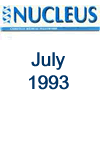I grew up in a Christian family and attended the local Anglican church from my first days. I chose to follow Christ myself when I was about 18 and then moved to London to start at medical school later the same year. On joining the CU and a local church I encountered many other Christians with different backgrounds and ideas to my own. One of the subjects about which there was the largest number of opinions was that of guidance. It was with this background that I chose the seminar, 'Guidance' at the National Conference in 1992. The recommended book, 'The Last Word on Guidance', is the one I now come to review.
The book's comment on itself begins with the words, 'Many Christians today struggle with 'guidance'. There is a bewildering array of theories about how we should discern God's will for our daily lives. . . With that start, I was immediately interested by the book as it was speaking directly into my situation.
The authors begin with the theory that if we could better understand God's plan and our part in it, then our need for, and understanding of, guidance would change. Different things would matter to us; we would have different decisions to make. The first part of the book therefore explored 'The Grand Design' and our part in it, attempting to bring our priorities in line with God's. Having explained the destination to which God's guidance leads, the authors then address the 'hot' issue of 'How Does God Guide?' It was in reading this section that I felt my previous understanding of guidance begin to untangle. Once we realize God's actual purpose for us, we begin to understand what really matters to God. 'If something is important and we need to know it in order to fulfil God's plan, then it is there for us in the Bible.'
The authors divide the decisions we make into three categories, 'right/wrong, wise/unwise and who cares?' The Bible speaks directly on the right/wrong issues, such as stealing or committing adultery. God has also given us decisions with more than one right choice, in that some decisions are not a matter of right or wrong but of wisdom. He guides us about these too, and they often incorporate some right/wrong components. Who to marry is a good example. There are right/wrong components (for example, they must not be married already and must be of the opposite sex), but in the end, when these have been considered, the final decision is one of wisdom and we must make that choice for ourselves without feeling guilty that we are making the 'wrong' choice. If the issue's not in the right/wrong category then we can't make a wrong choice.
The third category, 'who cares?', is comprised of such choices as whether I buy blue or green toilet paper we just make up our minds and choose.
Thus, this excellently written little book cuts through the tangles of contemporary thinking on guidance and, by returning to basic principles, sets forward a very simple scheme. The authors finish by presenting three case examples - work, church and marriage. They demonstrate how their scheme can be applied to each of these areas of decision making, and suggest what questions really are important to God. We may find the whole concept about which the book speaks difficult as often our 'important' decisions are not the ones God has on the top of his list; we have our own agendas. As the authors admit, 'for those of you raised on a traditional approach to guidance with its special wills and 'second bests' and fleeces and peaces all this is no doubt quite radical. But it is also quite liberating.'
I commend the book to you and am personally of the opinion that it really is (or ought to be) the last word (or at least the last book) on guidance.
Reviewed by:
Brian Cleaver
Clinical MedicaI Student
Charing Cross & Westminster































